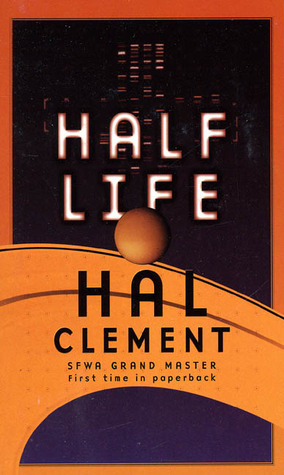
Half Life
کتاب های مرتبط
- اطلاعات
- نقد و بررسی
- دیدگاه کاربران
نقد و بررسی

August 30, 1999
In his first novel since 1987's Still River, SFWA Grand Master Clement imagines a time 75 years in the future when life on Earth, from plant to human, has fallen into an unstoppable decline and medical science cannot hold back a new wave of plagues. A group is sent to investigate primordial life on Titan, one of Saturn's moons, in hope that understanding how life begins will help humans forestall their extinction. The 50 crew members are all infected with the incurable diseases that are ravaging Earth, their number determined by a calculation of their half-life (the time it will take for half of them to die). They are "persuadees," trained in the disciplines of military action and scientific thought. Because of their fragile health, they mostly remain locked in their separate quarantined rooms and control their equipment via virtual reality hookups. One of the crew strategically kills himself--unable to continue suffering the pain of his illness and in order to provoke a crucial advance in the group's knowledge--which lends a different meaning to the term half-life. As they wait for each other to die, the crew members become absorbed in their work and emotionally distant from each other. This distance, and the lack of consistent character development, makes it difficult for the reader to feel sympathy for them. Though the action is abundant, much of it is relayed through flavorless dialogue that grows monotonous, ultimately impeding the narrative. A good start and intriguing background won't suffice to carry readers all the way through this disappointing novel by one of the SF greats. (Sept.) FYI: Clement, who's 77, published his first short story 57 years ago.

September 15, 1999
Set in the 21st century, when numerous new diseases threaten the existence of the human race, a crew of terminally ill scientists and researchers undertake a one-way journey to the moons of Saturn. There they race against time to find a clue to the origins of life that will help them develop a means of combating the illnesses of Earth's population. Minimal characterization and fast-paced action interspersed with a wealth of scientific detail mark the first novel in ten years from sf veteran Clement. Suitable for large sf collections.
Copyright 1999 Library Journal, LLC Used with permission.

September 1, 1999
Average lifespan has fallen to 20 years, for diseases are fast outstripping the medical capability to control and treat them. A team aboard the space vehicle "Oceanus" is to journey to Saturn's moon Titan to research the possibility of planting a prebiotic colony there. Only three of the crew are not dying from various diseases, and while their general attitude is hopeful, and they are polite and helpful to one another, the prevailing atmosphere among them is not healthy. Planting a colony may be iffy, but the crew can plant laboratories and factories capable of some remarkable things on Titan's remarkable surface, which seems to be mostly ice, spotted by pools of tar and various chemicals. In any event, the first walker on Titan is killed by flying ice--knocked really cold. But despite injuries, deaths, and other catastrophes, in the end, the remaining crew members are still driven by the urge to discover. Clement's delightfully ironic, dry humor proves vital to this imaginative book consisting largely of conversation. ((Reviewed September 1, 1999))(Reprinted with permission of Booklist, copyright 1999, American Library Association.)

























دیدگاه کاربران